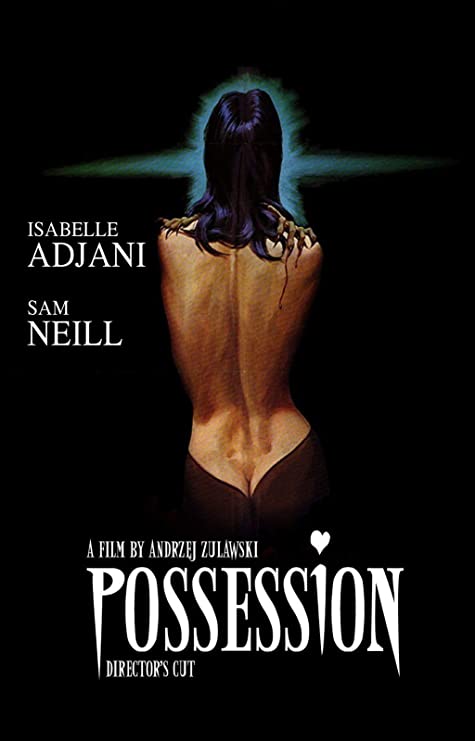Over forty years later, Andrzej Żuławski’s Possession (1981) provides a genre mashup to remember. Part psychological drama and part slasher movie, stars Isabelle Adjani and Sam Neil fully commit to the insanity around them. What transpires is an unforgettable portrait of a failing relationship masked by apocalyptic horror.
Synopsis
Mark (Neil) is a spy returning home to West Berlin from a mysterious mission after a long time away. His wife Anna (Adjani) wants a divorce for ambiguous reasons. Mark turns over their apartment and their son Bob (Michael Hogben) over to Anna and leaves. After a few drunken weeks, Mark returns to make amends, but Anna’s behavior is erratic.
Mark discovers Anna has taken a man, Heinrich (Heinz Bennent), as a lover. Meanwhile, Mark becomes entangled with Bob’s teacher Helen (also Adjani), who looks just like Anna but with green eyes. As Anna’s goings-on continue to befuddle Mark, he hires a private investigator to decode his wife’s behavior.
As Anna’s behavior becomes more and more uninhibited throughout the film, something more nefarious starts to emerge. Mark’s behavior turns as he finds himself wanting to stop the madness and save the woman he loves.
Themes
The first 30 minutes of Possession are all based on the struggles of the marriage. As unexpected as Anna’s behavior is, it is still sensible. Mark has no good reason for why Anna has left him, but he eventually discovers her infidelity. Anna’s rationale is unspecific, and as soon as he investigates, bizarre events occur.
The entire film could easily be interpreted as a “fantasy” that Mark has created to explain what is happening to him. For Mark, it is much easier to accept murder and insanity than to accept his wife no longer loves him. His idealistic view of his marriage could only be tempered by some otherworldly force.
Mark is so forceful in his determination to discover the reasoning for Anna’s betrayal that he never looks inward. He yearns to discover Anna’s faults and issues, and never takes responsibility for his actions. He never even acknowledges them.
All of the action in Possession is quietly set in West Berlin, at the height of Cold War hysterics. The ever-present wall works as an apt metaphor. The constant push-pull of Mark and Anna is cleverly mirrored in the city, as well as the competing political philosophies.
The Cast
Adjani is totally committed to what Żuławski asks of her in Possession. She is calm and gentile as Helen, and a spastic whirlwind of energy as Anna. If Adjani ever wavered on her completeness of the portrayal, the film’s energy would sink. Instead, every maddening thing that occurs is complemented by the madcap aria of sexual terror that Adjani displays.
Adjani’s show-stopping scene comes as she completely breaks down during a blood-curdling miscarriage that takes place in the subway. Whatever insanity happens in the film is fully endorsed by how hard Adjani is going to sell it.
Sam Neil as Mark is equally up to the task. His initial response is to lash out with confusion, misunderstanding, and anger. As the film progresses, Mark begins to exhibit similarly strange behavior. What starts as wide-eyed incredulity gives way to mania.
Supporting players Margit Carstensen and Heinz Bennent also dive into the madness asked of them. Michael Hogben warrants special mention. Children are rarely allowed to be children in films. Bob is in no way precocious or questioning. Rather, he watches confused, and waits to finally understand.
Conclusion
Possession has endured for over four decades due to the commitment to the material. Films with overtly sexual and supernatural elements rarely draw such devotion to the craft by their actors. Upon further inspection, the film becomes an onion of complexity. Politics, love, sex, devotion, and parenthood: these are all part of what makes this film so lasting in the public consciousness.
